
Korea’s regulatory environment, however, presents challenges to U.S.
KOREA AIR FREE
chemical exports receive duty-free benefits under the Free Trade Agreement between the U.S. However, Korean manufacturers, especially for electronic and semi-conductor sectors have been diversifying suppliers, as well as investing substantially in domestic technologies after Japan’s export bans in 2019 on raw chemicals for semiconductor production. Korean manufacturers have long been conservative in changing supply channels that often require the modification of the production process. Imported chemicals are essential in the production of some of Korea’s top exports, which include: semiconductors, electronics, wireless communication equipment, flat display, computers, automobile/auto parts, ships, plastics, and petrochemicals. Korea imports raw materials to process and re-export them to third countries. As a result, market demand for sophisticated specialty chemicals present opportunities for foreign importers. The technological level of dyes & pigments from domestic producers appears to be on par with other advanced countries, but it lags in the development of specialty chemicals that require the accumulation of fundamental core technologies acquired by substantial R&D investments and time. Korea’s specialty chemical market is facing new issues from China’s slower economic growth rate, environmental safety controls, and lack of original technologies. In 2020, Korea’s export grew by 23 percent, but import decreased by 2.6 percent, which produced $5,680 million of trade surplus. holds around 18 percent share of the specialty chemical import market followed by China. In 2020, the estimated total value of Korea’s specialty and fine chemicals market was $55 billion, representing a 3 percent increase from the previous year. Still the demands for high quality, sophisticated chemical products and associated substances production presents a lucrative opportunity to the U.S. Korea’s chemistry industry has been rapidly developing and the country is ranked at the world’s 5th production scale as of 2019. Companies Currently Exportingĭata Sources: Industrial Statistics Analysis System, Ministry of Trade and Industry

“It is unlikely that any less anti-competitive alternative is available to the merger for Asiana to remain in operation,” Mavcom adds. Moving beyond the Seoul-Kota Kinabalu analysis, Mavcom also accepted Asiana’s “failing firm defence”, in which it notes that the Star Alliance carrier was facing substantial financial challenges and was “unlikely to be able to meet its financial obligations in the near future”. The commission adds that the barrier to entry on the route remains low, as all three carriers have added extra seats from 2016 to 2019. Given the nature of the route where majority of the passengers are non-time sensitive, there is limited impact on the passengers as they would always have the option to choose one-stop services instead,” Mavcom adds.

“The commission also notes that the…route is a relatively thin route. This is because South Korea’s Ministry of Land, Infrastructure and Transport regulates airfares set by the country’s carriers. The commission found that although the post-merger market share on the route would be high - based on 70-80% share in a pre-pandemic setting - it “would have limited unilateral effects as the parties will not be able to increase the airfares above competitive levels”. Jeju Air, a low-cost carrier unaffiliated to the merger, is the third Korean carrier to operate direct flights between both cities. Mavcom scoped its analysis on one direct route between South Korea and Malaysia - Seoul-Kota Kinabalu - given that both Korean Air sister company Jin Air and Asiana low-cost arm Air Seoul operate the route. Decade of Airline Excellence Awards 2020Ī Korean Air Airbus A380 with an Asiana A380 at Seoul Incheon airport.


 0 kommentar(er)
0 kommentar(er)
